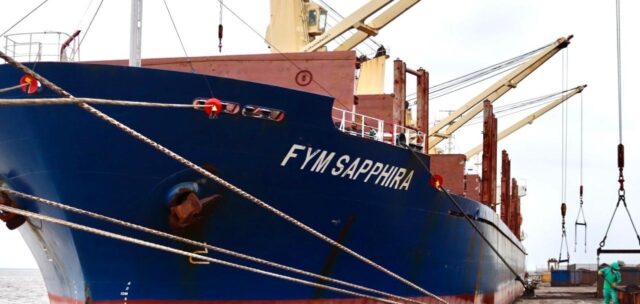
(3 Minutes Read)
This record was achieved on the loading of MV FYM SAPPHIRA which completed her full loading operation of 27,588 tons in 45 hours and 48 minutes, between the 11th and 13th of June 2024.
Cornelder de Moçambique has set a productivity record in chrome ore handling, achieving an average daily gross productivity of 14,446 tons, a 40% improvement on the previous record of 10.400 tons per day. This record was achieved on the loading of MV FYM SAPPHIRA which completed her full loading operation of 27,588 tons in 45 hours and 48 minutes, between the 11th and 13th of June 2024.
The excellent productivity is a result of the strong investment in the handling capacity of Bulk Minerals. CdM has just completed the first phase of the minerals terminal which includes 4 Hectares of storage yards where both bagged and bulk minerals can be stored and handled efficiently.
CdM has this year taken delivery of a new fleet of 35t Excavators and large 7CBM Front End loaders that can load bulk skips in record time that are pulled to the quay by a renewed and expanded fleet of Terminal Tractors and Trailers. All equipment movement is monitored by our reorganized general cargo terminal organization using the new Terminal Operating System as well as the Equipment Monitoring System.
Excellent collaboration of the vessel’s crew and its local agents was also decisive for the success of the operation. The new record for chrome handling follows three other records achieved in the last 2 months, for loading granite blocks, the discharging of clinker, and the discharge of bulk sulfur.
Read Also:
https://trendsnafrica.com/mozambique-to-lay-additional-100-kilometre-pipeline/
Phase 2 of the Minerals Terminal will start construction later this year and will create a new access and exit for the terminal and dedicated weighing facilities. This will further improve the flow of trucks and equipment enabling even higher productivity and better efficiency. New ship loading methods using an in-house designed skip and container tipping system will be introduced in the second half of the year. With all these improvements, we expect that the current record will not stand for long.











